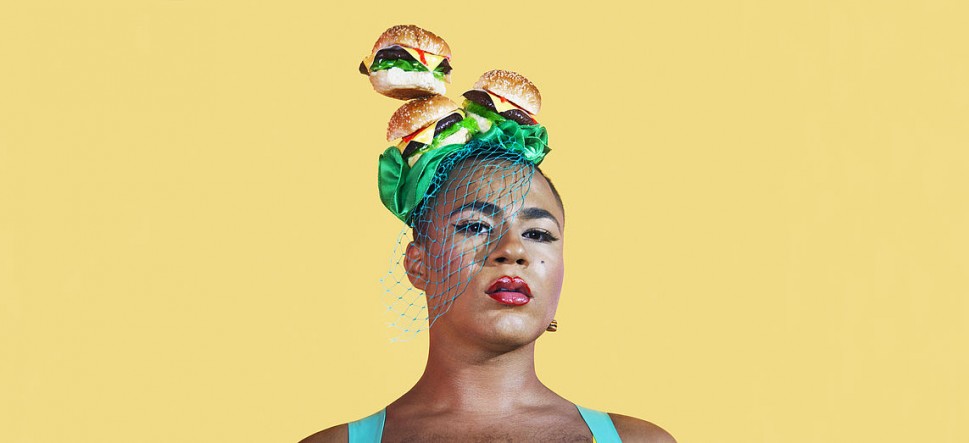Burgerz
Travis Alabanza
HAU Hebbel am Ufer, Berlin
June 28-30, 2019
In 2016, someone threw a burger at Travis Alabanza. The act occurred in public, and in broad daylight; the burger was accompanied by a transphobic slur. In Alabanza’s not-quite-solo performance Burgerz —presented as part of HAU’s festival “The Present is Not Enough: Performing Queer Histories and Futures” — this traumatic event becomes a catalyst for performer and audience to jointly face the violence and aggression to which trans bodies are increasingly subjected in public, and the complicity of the rest of us who (literally and figuratively) stand by and let that violence occur. Burgerz is an urgent response to an urgent situation, a clear and impassioned call for responsibility and recognition.
After the assault, Alabanza explains at the top of the piece, they wanted to become familiar with burgers on an intimate, material level in order to reclaim some agency over the relationship between burger and body. As part of this reclamation, they intend to cook a burger now, onstage. They request an audience volunteer to help them do so, further specifying that the volunteer should be a cisgender white man. (Alabanza is black, trans, and gender-non-conforming.) For most of the remainder of the performance, Alabanza shares their stage space—dominated by a large kitchen island—with this audience member, as the two together prepare, cook, and assemble a burger.
The relationship between Alabanza and their volunteer sous chef (at the performance I attended, a soft-spoken man I’ll call John) has an uneasy charge, haunted as it is by the specter of violence—the burger-thrower was also a cis white man—and structural yet deeply personal imbalances in power and privilege. It’s a complex dynamic: the performer, who knows the script and is in control of the onstage action, holds more power in the immediate situation, but offstage that balance is reversed. (In answer to Alabanza’s pointed query, John confirmed that he was more anxious at that moment in the theater than when walking down the street outside.) The performance keeps things off balance, refusing to let the relationship between the two settle into either an easy “can’t we all just get along” sentimentality or simple antagonism. This is also true of the performer’s relationship to the audience, which oscillates between camaraderie and confrontation. In one of the performance’s most powerful moments, Alabanza decries the fact that experiences like theirs often seem to require artistic expression and institutional validation (i.e. this very performance) to be seen as worthy of our attention—perhaps to be seen at all.
In the ritual of preparing food together, an intimate social encounter deepened by the fraught complexities of the volunteer-performer relationship, Alabanza has located a compelling framework for addressing our responsibilities to one another. Authentic communication is one of those responsibilities, and the performance’s strongest moments came from seeing it appear, delicate and raw as meat, between the two bodies onstage. At other times, that communication seemed hamstrung by a rigid script that didn’t always allow Alabanza (an experienced and charismatic performer demonstrably capable of riffing in real time) to engage with what John was actually bringing to the table—verbally, affectively—in the moment. I hesitate in writing this—am I (a white, male-presenting genderqueer person) really worried that the white man wasn’t being heard in this performance? This is perhaps a fair charge, but what Alabanza is asking of us is to listen and be present: to hear the voices that are asking for our help, to genuinely see and respond to what is happening in front of us rather than looking away. Burgerz is most successful when it enacts that genuine exchange, when it doesn’t rush past the awkwardness and discomfort of humans figuring out how to responsibly share space with each other and with all of the systemic baggage they each carry with them. It’s uncomfortable, it’s dangerous, and it’s how change begins to happen.
Photo: Elise Rose

